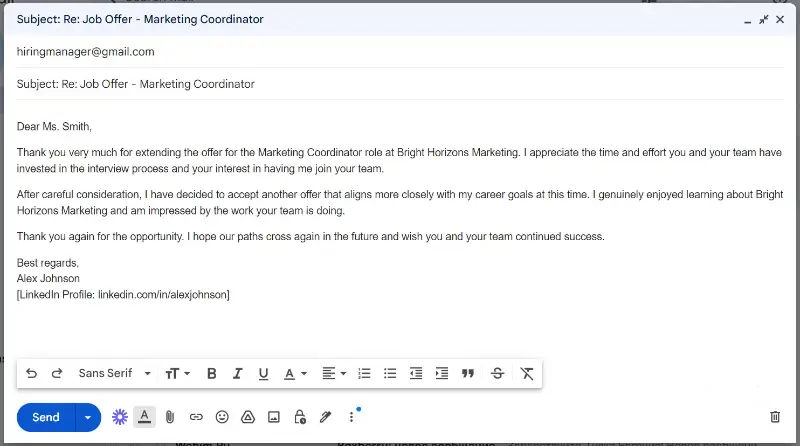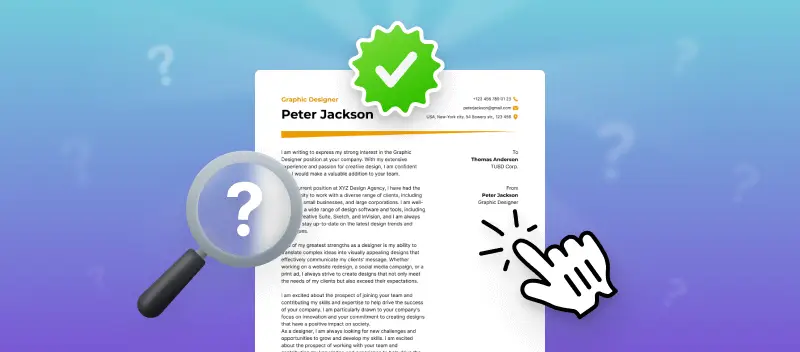Receiving an invitation to an interview is an important milestone in your job search. However, there are times when you may need to decline the opportunity.
Whether it's due to a change in your work direction, another offer, or personal reasons, knowing how to politely decline an interview is crucial.
In this guide, we'll walk you through the steps to reject an interview with grace and tact, ensuring you maintain positive relationships with potential employers. By following our tips and using the sample responses provided, you can navigate this process smoothly.
Reasons to decline an interview
There are various legitimate reasons why you might need to turn down a job interview invitation. Each of these causes reflects personal or professional considerations that influence your career path.
We’ll explore some common scenarios for declining an interview and provide insight into how to address each situation appropriately.
1. Already accepted another offer
One of the most straightforward reasons to decline a job interview is that you have already accepted a job offer from another company.
Maria Lopez accepted a marketing job at BrightWave and emailed GreenLeaf Marketing to politely decline their interview invitation.
This situation is common and often results from a job search that leads to multiple opportunities. It’s important to handle this scenario with courtesy, as you never know when you might cross paths with the employer again.
When declining a job interview due to having received another offer, your communication should be clear and appreciative. You want to acknowledge the opportunity they’ve extended and express your regret that you cannot proceed further.
How to say no to an interview - example response:
Thank you very much for the invitation to interview for the Dentist position at Bright Smiles Dental Group. I am honored by the opportunity to be considered for this role and appreciate the time your team has invested in reviewing my application.
I have recently accepted an offer with another dental practice that aligns closely with my career goals and professional aspirations. As a result, I must respectfully decline the opportunity to interview with you.
I have been genuinely impressed by the work and reputation of Bright Smiles, and I hope our paths may cross again in the future. Thank you once again for your understanding.
2. The role is not a good fit
Realizing that a role isn’t the right fit can be a crucial moment in your career decision-making process. This could occur after a closer examination of the job description, company culture, or how the role aligns with your professional goals.
Jason Kim realized the product manager role at TechNova required heavy coding, which didn’t match his skills, so he declined the interview.
While it can be disappointing to turn down an opportunity that initially seemed promising, it’s important to prioritize positions that genuinely match your skills, interests, and career aspirations.
How to decline a job interview: example response:
Thank you very much for considering me for the Marketing Manager position at Creative Solutions Inc. I appreciate the opportunity to learn more about your team and the exciting projects at your company.
After careful consideration and a thorough review of the role's responsibilities, I have determined that this position does not meet my current career goals as closely as I had initially hoped. As such, I must respectfully decline the job interview at this time.
I hope we can stay in touch for potential future opportunities that might better match my background and interests.
Thank you once again for the opportunity.
3. Personal reasons
When family commitments arise, they may necessitate stepping you back from job opportunities, including interviews. It’s important to communicate these reasons with clarity and respect to ensure you maintain a professional image while addressing your current needs.
Samantha Carter had a family emergency and had to withdraw from her upcoming interview at ClearStream Finance.
How to decline an interview offer: example response:
I am grateful for the opportunity to interview for the Product Designer role with Adobe. Unfortunately, due to some health-related issues that require my immediate attention, I need to withdraw from the interview process.
I apologize for any inconvenience this may cause and sincerely appreciate your understanding. I hope to have the chance to reconnect when circumstances allow.
Thank you for your consideration.
4. Commute issues
Location problems arise when a job’s geographical requirements create practical difficulties for a candidate.
David Nguyen declined an interview at UrbanTech Solutions after realizing the daily commute from his home would be too long.
Long commute times can disrupt work-life balance and affect job satisfaction, especially if travel is extensive.
Relocation involves significant life changes like finding new housing and adjusting to a different cost of living, which may not be feasible for everyone. Inconvenient transportation options, high commuting costs, and rigid on-site requirements can also pose challenges.
When facing these issues, assess how they impact your daily life and job satisfaction. If you need to decline an interview due to location or commute reasons, consider discussing possible alternatives like remote work.
How to deny an interview: example response:
Thank you very much for considering me for the Financial Analyst position at JPMorgan. I am excited about the role and your company’s vision.
However, I’ve realized that the on-site location requirement poses a significant challenge for my current situation. As I am seeking remote work, I regret that I must reject the interview at this time.
Thank you for your understanding, and I hope there may be future opportunities with JPMorgan that align with my job preferences.
5. Industry concerns
Company reputation can be a major factor. Negative news, poor reviews from employees, or ethical issues can lead to doubts about the work environment. If you have concerns about a firm’s public image or how it is perceived, it can affect your willingness to join the team.
Emily Parker decided to focus on renewable energy startups and declined an interview with EcoEnergy, a fossil fuel company.
If an organization is experiencing financial difficulties, frequent leadership changes, or instability, it can signal potential job security problems. Candidates might worry about the company’s long-term prospects and their own career stability.
If you decide to withdraw from an interview or job offer due to these worries, be honest in your communication. Highlighting your reasons without disparaging the industry can help maintain a positive image.
How to tell an interviewer you are not interested? example response:
Thank you for the opportunity to interview for the Business Analyst position at IBM. I appreciate your interest in my background and the chance to discuss how I might contribute to your team.
After careful consideration, I have decided to turn down the job interview process. I have some doubts regarding the field’s current challenges. These have led me to believe that this role may not align with my long-term career goals at this time.
I appreciate your understanding and wish IBM continued success. Thank you once again for the opportunity.
FAQ
- Should I respond to every interview invitation, even if I’m not interested?
- Yes, it’s important to respond. Ignoring the invitation can harm your professional reputation and potentially burn bridges with the recruiter or company.
- Is it acceptable to decline after initially agreeing to the interview?
- While it’s best to avoid this situation, it’s acceptable if your circumstances change. Apologize for any inconvenience caused and notify the company as soon as possible.
- What’s the best way to decline—email, phone, or in person?
- Email is usually the most appropriate method for turning down an interview. It provides a written record and allows you to craft a thoughtful answer. Use phone communication if the invitation came through a direct call.
- Should I follow up after declining an interview?
- A brief follow-up thanking them again for the opportunity is a good practice, especially if you want to keep networking or consider future positions.
How to decline an interview: conclusion
Declining a job interview can be a delicate task, but handling the situation thoughtfully not only reflects well on you but also keeps the door open for future opportunities.
By following the recommended strategies and using the provided examples, you can manage this process with confidence and maintain a strong network of professional connections.
Create your professional Resume in 10 minutes for FREE
Build My Resume



